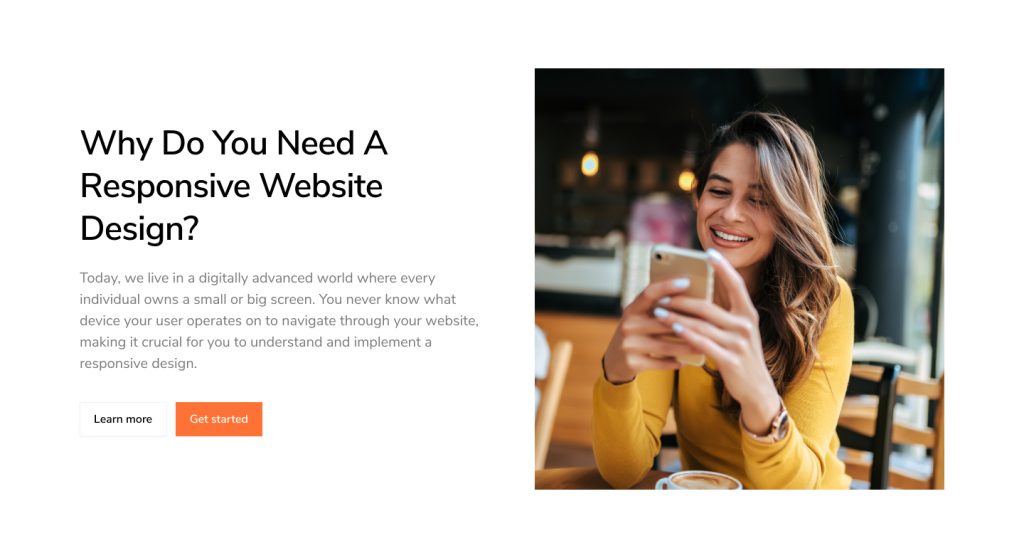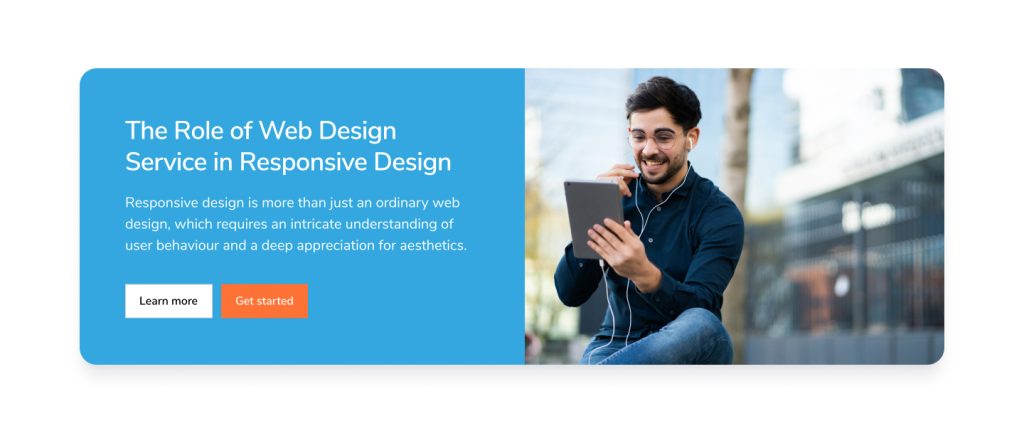We know how website design has sprung up as an important factor in business website development. Without a great web design, your website lacks customisations and personalisation of any kind, which can seem weary to users.
Your website needs build a responsive web design that enhances your overall user interface in today’s online world. This is where website design services come in and help you with a responsive website design.
A responsive web design can help your site become mobile-friendly and suitable for small and big screens, which in turn helps you engage users and increase visitors to your site. The more responsive your website design is, the more engagement you receive.
Well, this is just a gist of the significance of response design. Today, we will dig deeper into the broad concept of responsive web design, its benefits and the role a web design service plays in bringing a great website to your target audience.
So, let’s get started.
Table of Contents
What is Responsive Web Design?
Responsive design is the process of putting together a website to elevate the site’s content and design elements to match the screen size when viewed. It puts everything in exact focus and automatically adjusts the website design elements like images, videos and text on all screen sizes.
In short, if your website has a responsive design, your user does not have to put in any extra effort to adjust the screen while navigating to your website.
When we talk about responsive design, it basically aims to eliminate any kind of resizing, zooming, scrolling or any effort put in while navigating an unoptimised website. When a site is not optimised correctly, it tends to be annoying and frustrating for a user trying to access the site, which results in higher bounce rates.
With responsive design, you need not design a website for different screen sizes to make it appear fit for mobile users. With a responsive design, you can map up one single website design that adjusts automatically per the specific screen and design your visitors are using.
Did you know? It takes about 50 milliseconds (that’s 0.05 seconds) for users to form an opinion about your website that determines whether they like your site or not, whether they’ll stay or leave – Source
Related: 7 Best Practices for Eco-Friendly Website Design

Why Do You Need A Responsive Website Design?
Today, we live in a digitally advanced world where every individual owns a small or big screen. You never know what device your user operates on to navigate through your website, making it crucial for you to understand and implement a responsive design.
About 57% of users say they do not recommend websites poorly designed for mobile devices.
A responsive design adapts and modifies itself to different screen sizes and devices and makes sure your website looks and functions seamlessly on smartphones, tablets, laptops, and desktops.
If your website is responsive, it can offer a consistent and optimised user experience, regardless of the device used. This ensures your audience can access your content, navigate your site, and engage with your offerings without any frustrating hurdles. It’s no longer an option but a fundamental requirement for online success.
Let’s get into some more reasons why you need a responsive website design:
Enhanced User Experience
Responsive design isn’t just a small word; it’s a great enhancement to the user experience. It’s like having a magical web design genie that tailors your website to fit any screen. When visitors
access your site, whether on a smartphone, tablet, laptop, or desktop, the responsive design ensures that the content flows seamlessly and elegantly. Text is legible, images look stunning, and navigation is a breeze.
But what’s the real magic here? It’s the extended stay of your users on your site. Longer
on-page engagement is a direct result of responsive design. Visitors don’t have to pinch, zoom, or squint to consume your content.
They effortlessly explore, read, and interact.
This experience reduces bounce rates and increases the chances of visitors becoming loyal customers, thus enhancing user experience.
Improved SEO Ranking
Responsive design isn’t just about user convenience; it’s also about winning the favour of search engines, particularly the search engines. Search engines prioritise responsive websites in their rankings. Google’s algorithms reward mobile-friendly sites because they ensure a consistent and high-quality user experience, regardless of their device.
Why does this matter? Better search engine rankings mean more visibility and discoverability. Your site is more likely to appear on the very first page of search results, driving organic traffic and potential customers to your digital doorstep. So, responsive design isn’t just a convenience for users; it’s a strategic SEO move to make your site shine bright in an over-crowded online landscape.
Also Read: 8 Free SEO Tools to Boost Pagespeed & Rank Higher
Increased Mobile Traffic
The shift in internet consumption patterns is undeniable—mobile devices have become the primary gateways to the digital world. A significant portion of internet traffic now flows through smartphones and tablets. If your website isn’t equipped to cater to this mobile audience, you risk missing out on a vast pool of potential visitors and customers.
Thus, responsive design ensures that your site seizes the opportunity this growing mobile audience presents. It captures their attention, providing an optimised experience that keeps them engaged. Your content is readily available and easy to navigate on smaller screens.
Cost-Effective Maintenance
Managing a separate mobile site can be a headache. It involves duplicating content, ensuring that both versions are up-to-date, and addressing potential compatibility issues. All of this complexity translates into higher costs. Responsive design offers an easy and super solution to this problem by eliminating the need for a dedicated mobile site.
A single, responsive website saves time, effort, and money on maintenance. Any updates or changes you make are instantly reflected across all devices, ensuring consistency and ease of management. It’s a cost-effective way to maintain your online presence while delivering a consistent experience to all your users.
Related: How Much Does Website Maintenance Cost?
Future-Proofing Your Site
The digital world is in a perpetual state of evolution. New devices with distinct screen sizes and resolutions emerge regularly. Ensuring that your website remains accessible and functioning for this diverse array of devices can be tricky.
Enter responsive design as your shield against obsolescence. It future-proofs your website, making it adaptable to new devices as they appear on the scene. You won’t need to worry about overhauling your site each time a new gadget becomes popular.
Instead, your responsive design ensures that your site seamlessly accommodates the screens of the future, guaranteeing that your online presence remains relevant and accessible to all.
The Role of Web Design Service in Responsive Design
Responsive design is more than just an ordinary web design, which requires an intricate understanding of user behaviour and a deep appreciation for aesthetics. Achieving a responsive design that truly works is no small feat, and that’s where a web design service becomes invaluable.
They understand how to create an aesthetically pleasing, user-friendly, devise-responsive, secure and fully optimised WordPress website to elevate a brand’s online presence.
Let’s look at some major roles that web design services play in offering responsive design for the website.
Expertise
Responsive web design is an innovative blend of aesthetics and functionality. It’s about making your website visually appealing while ensuring it functions flawlessly across devices. A professional web design service brings a team of experts who understand design principles, such as layout, typography, and colour, to create an engaging and visually pleasing user experience.
Technical Proficiency
Responsive design isn’t just about how a website looks; it’s about its performance. It involves coding, optimising images, and ensuring smooth navigation. A web design service has a team of professional developers who can handle the technical aspects of responsive design, ensuring that your website loads quickly and operates seamlessly on all devices.
User-Centric Approach
Responsive design is all about putting the user first. A professional web design service takes a user-centric approach. They understand how users interact with your site on various devices and design with these user behaviours in mind. This leads to an improved user experience, longer on-page engagement, and reduced bounce rates.
Cross-Browser and Cross-Device Compatibility
The world of web browsing is diverse, with numerous browsers and devices in use. A web design service ensures that your responsive design is not limited to a particular browser or device. They thoroughly test your site to guarantee cross-browser and cross-device compatibility.
Ongoing Maintenance and Updates
Responsive design isn’t a one-time endeavour; it requires ongoing WordPress website maintenance and updates to stay relevant. A web design service can provide you with continuous support, ensuring that your website remains responsive as new devices and technologies emerge.
SEO-Friendly Design
Search engines prioritise responsive websites in their rankings. A web design service ensures that your responsive design is SEO-friendly, boosting your search engine rankings and making your site more discoverable.

Conclusion
Moral of the Story- your website is a tool for attracting judgment. Whether it’s good or bad, that’s in your hand. However, you can always play a bit cool with an excellent responsive website design with the help of an efficient website design service.
Remember that a bad website can take you down, but a good website with great design brings you up like no other. And responsive web design will always play a significant role in this. Thus, choosing the best makes the first impressions matter and count.
At hosting.co.uk, we understand the importance of website design in this digital landscape. We offer bespoke custom website design services to build a stunning website from scratch. So, move past a stock template and get a unique, user-friendly website that makes your brand shine.
FAQS
Why is responsive design so important for websites in 2023?
Responsive design has defined its significance with the growing popularity of mobile devices. A responsive website ensures a seamless user experience, improves SEO, and captures mobile traffic.
What are the key benefits of responsive design for businesses?
Responsive design offers several benefits, including enhanced user experience, improved SEO rankings, capturing mobile traffic, cost-effective maintenance, and future-proofing your website. It can lead to higher user engagement, better search engine visibility, and cost savings on managing separate mobile sites.
How can a web design service help with responsive design?
A web design service can help by providing expertise in design principles, technical proficiency, a user-centric approach and ongoing maintenance. They ensure that your website looks great, performs flawlessly on all devices, and remains up-to-date.
Do I need a separate mobile site if I have a responsive design?
No, a responsive design eliminates the need for a separate mobile site. With this, you can ensure that your website adjusts and resizes to the screen size and resolution of any device out there. This streamlines maintenance and provides a consistent user experience across all devices, making it a cost-effective solution.
How can responsive design benefit my website’s SEO?
Responsive design can boost your website’s SEO in multiple ways. Search engines prioritize mobile-friendly sites, leading to improved search engine rankings. It also reduces bounce rates, as users can easily access your site and engage with your content on any device.
